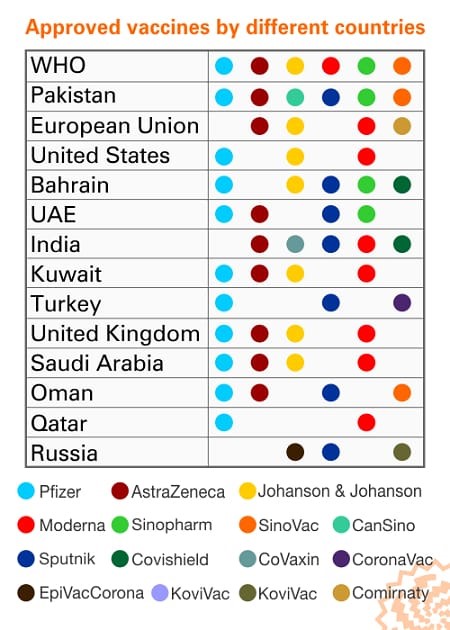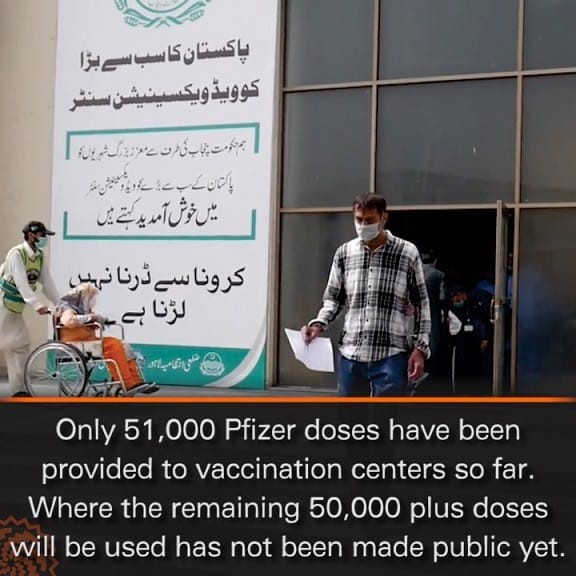Aleem Shahid arrived in Pakistan on 21st January 2021 to visit his family and was expected to return to work in Saudi Arabia before 21st June but has not.
He has been working there since 2010 at an event management company – earning 70,000 rupees a month on average. He visits his family after every three years for six months at a stretch and then goes back to work. This time round, his holiday has turned into a painful experience for him.
The origin of his trouble lies in a directive issued by the Saudi government a few weeks ago. It stated that only those foreigners can enter Saudi Arabia who have received doses of Pfizer-BioNTech, Oxford-AstraZeneca, Moderna or Johnson & Johnson vaccines. Those who have not been vaccinated or have received other vaccines will be either disallowed to get into that country even if they have valid visas or they will have to be quarantined at their own expense for at least 15 days.
As soon as Aleem came to know about the directive, he started searching for an opportunity to receive one of those vaccines. When he went to the lone government facility in Sahiwal where vaccination against Covid-19 is being done, he was told that the limited stock of AstraZeneca that the center received from the federal government has run out. He then asked his relatives, friends and even acquaintances to tell him if AsteaZeneca vaccine was available at any center near them. All of them got back to him with a negative answer. The vaccine was out of stock everywhere.
The stocks were replenished only on 19th June – just two days before his scheduled return to Saudi Arabia. Aleem hurriedly visited Sahiwal’s vaccination center and got the first dose of the vaccine immediately. To his utter distress, however, a nurse at the center told him that he would get his second dose on 19th September – a good three months after the expiry of his six-months leave from work.
Aleem felt stupefied. He was extremely worried that his work visa will be cancelled if he failed to report at work soon. The cancellation, he says, will cause him a loss of 700,000 rupees which he has invested in getting the Saudi visa and setting up his accommodation in Saudi Arabia.
So, he started considering the option of receiving his second vaccine shot in Saudi Arabia but his distress only increased when he was handed no documentary evidence of receiving the first shot. “I am not even sure if I received AstraZeneca vaccine or some other one because the government officials at the center just dismissed me when I asked them about it,” he says.
Aleem also contacted the National Database and Registration Authority (Nadra) as well as the Punjab Overseas Pakistanis Commission seeking help in getting a proof of his vaccination. “No one in these offices bothered to guide me regarding the documentation. I am appalled at how this system treats expatriate Pakistanis,” he says. (The official explanation of this lack of documentary evidence is that a vaccination certificate is issued only after both doses of vaccine have been administered.)

Aleem is certain that he will be quarantined as soon as he lands in Saudi Arabia without any proof that he has received the vaccine’s first dose. Quarantine will cost him over 5000 riyals (or 200,000 rupees). “I am an ordinary worker. I cannot even think of spending this amount of money on merely isolating from others,” he says.
Unfair distribution
A crowd of nearly 2000 people belonging to various parts of Khyber Pakhtunkhwa gathered at 9th Avenue in Islamabad on 1st July 2021 and blocked the city’s main thoroughfare, Jinnah Avenue, for more than six hours. They were demanding that they be administered Pfizer or AstraZeneca vaccine so that they can go abroad to join their jobs.
Two days earlier, many protesters from the same province stormed a mass vaccination center set up in Islamabad’s F-9 park after vaccinators there refused to administer either of the two vaccines to them. The glass doors of the center were shattered in the melee as many protesters tried to force their way in.
Similar protests have been taking place since 14th June.
Alam Zaib, a political activist in Lower Dir district of Khyber Pakhtunkhwa, where many of these protesters come from, criticizes the distribution of vaccines as being unjust. “Many Pakistanis working abroad belong to Khyber Pakhtunkhwa yet the number of vaccination centers and non-Chinese vaccines distributed to the province are much less than its population’s needs,” he says. “Consequently, these workers have been trying to get vaccinated in Islamabad but the government has only disappointed them there,” he says. “This is why they are protesting.”
The situation elsewhere in the country, however, is no different.
Ahmed, a 23-year-old resident of Balochistan’s Khuzdar city who does not want to be identified by his real name, is a flight away from availing a long-sought opportunity to study in Europe. But vaccination is standing in his way.
His is a long story of struggle. His working class father left his ancestral village in central Balochistan and moved to Khuzdar so that his sons could get education. Ahmad initially studied in Khuzdar and then went to Karachi where his elder brother was already doing a job after completing his education. He studied hard and won a scholarship, only to learn that his dream of becoming an academician might be jeopardized because he cannot get inoculated against Covid-19 with the right vaccine.
He has been running from one vaccination center to another and from one hospital to another in Karachi but has been unsuccessful so far in getting a shot of either Moderna or AstraZeneca vaccine. “If this opportunity slips away from me because of my inability to get the required vaccine in time, the state will have failed me twice,” says Ahmed.
The first time it failed him was when it did not provide him access to education in his native area.
Passing the buck
The task of procuring the vaccine was initially assigned to the federal ministry of health services. In March 2020, the government set up a national coordination committee on Covid-19. Headed by Prime Minister Imran Khan and comprising senior civil and military officials, it decided on 23rd April last year that the task of procuring anti-Covid vaccines will be performed by the National Disaster Management Authority (NDMA).

The government then gave NDMA 20 billion rupees to purchase 10 million doses of vaccines by 30th June 2020 but this target was never met. A year later, the supply of vaccines is far from being smooth. While Sinopharm vaccine has not been available in recent weeks even for those who have received its first dose, the supply and distribution of other vaccines such as AstraZeneca, Pfizer and Moderna are even more uncertain.
The main reason for this chaos is that Pakistan has purchased only a fraction of the ten million vaccine doses it allocated money for. The rest of its vaccination needs are being met through the generosity of other countries, including China, United Kingdom and United States, and multilateral organizations. These donors are supplying the vaccine as per their own schedules and not as per Pakistan’s requirements.
The largest bulk of the vaccine being administered in Pakistan arrives from China. Its supply started as early as February this year. The supply of non-Chinese vaccines started only a couple of months later and has remained both sporadic and limited since then.
For instance, the United States has given Pakistan 2,500,000 doses of Moderna vaccine only this week. These will be enough for 1,250,000 people. In recent weeks, Pakistan has also received 1,238,400 doses of AstraZeneca vaccine and 106,000 doses of Pfizer vaccine through COVAX, a global facility that is providing free vaccines to the developing countries
These doses will be sufficient only for 1,922,200 Pakistanis. If, however, these were administered on a priority basis only to Pakistanis who need to travel – for work, studies or business – to countries which do not approve the use of Chinese vaccines, there would have been no protests.
Statistics compiled by the Bureau of Emigration and Overseas Employment, a government institution that has its headquarters in Islamabad, show just that: these doses are more than enough for Pakistanis intending to travel abroad in coming months.
The bureau, for instance, has registered 114,458 people with foreign work visas in 2021. More than half of them -- 59,990 to be exact – come from Punjab. Khyber Pakhtunkhwa has the second highest of their number -- 33,966. These workers form the largest group of Pakistanis required to travel abroad this year.
Then there are more than 50,000 Pakistanis who go abroad every year for getting education. They similarly need to be protected from Covid-19 with the vaccines approved by the countries where they intend to study. Thousands of Pakistani expatriates who came back to Pakistan to visit their families are also seeking to get non-Chinese vaccines so that they can return to their adopted countries.
Also Read

Breathing uneasily: Oxygen shortage in government hospitals endangers the lives of Corona patients
Put together, the total number of these three groups of Pakistanis is just around a couple of hundred thousand people at a time. On paper, there is enough vaccine in the country to fulfil all their needs – and, that too, immediately. Yet, the government is ailing them very visibly.
And the reasons for that failure are equally obvious.
For one, the government has changed vaccination policies for Pakistanis intending to go abroad several times over the last few weeks. Federal planning minister Asad Umar, who also heads the National Command and Operation Center (NCOC), the headquarters of Pakistan’s anti-corona efforts, announced in April this year that those intending to perform Hajj and going abroad on work and study visas will get Pfizer or AstraZeneca vaccine on priority basis. The devil, however, was in detail. Women below the age of 40 would not be administered AstraZeneca vaccine unless they submitted a consent form; and those who had already received a dose of any other vaccine would not be administered Pfizer vaccine.
These policies were changed soon. Pfizer and AstraZeneca vaccines were now to be used for people with weak immune systems and chronic illnesses. AstraZeneca vaccine’s usage was also prohibited for anyone below the age of 40 irrespective of their gender.
As expatriate workers started protesting over the government’s failure to vaccinate them, NCOC changed its policy guidelines for the third time. Without offering any scientific evidence in the favor of its decision, it stated that AstraZeneca vaccine will now be administered to everyone above the age of 18. The time difference between the two doses of AstraZeneca and Pfizer vaccines was also reduced without any scientific justification: from the originally set 8-12 weeks to less than 28 days.
Meryem Razzaque, a victim of these changes, says she has had to reschedule her flight thereby incurring a loss of 11,000 rupees because she was not sure whether to get AstraZeneca vaccine or not. “I am below 40 years of age and I do not know whether I should follow the earlier NCOC guideline and not get AstraZeneca shots or I should follow the later guidelines that allows it to be administered to people as young as 18,” she says.
The second major problem in the government’s vaccination drive has been the distribution of vaccines. People are being vaccinated on the basis of the availability of a vaccine at a particular vaccination center – and not on the basis of which vaccine they require given their medical conditions or travel plans.
The distribution of Pfizer vaccine has been particularly mysterious. Only 51,000 of its doses have been provided to vaccination centers so far. Where the remaining 55,000 plus doses will be used has not been made public yet.
Then there is the usual official practice of passing the buck.
Colonel Allauddin, NDMA’s director operations, says his institution has nothing to do with the distribution of vaccines. “The only task assigned to NDMA is the procurement of vaccines,” he tells Sujag.
Representatives of NCOC, on the other hand, do not even respond to any inquiries regarding the distribution of vaccines. “We cannot guide you in this matter,” says an NCOC official.
This report was first published by Lok Sujag on 8 Jul 2021, on its old website.
Published on 7 Jun 2022



















